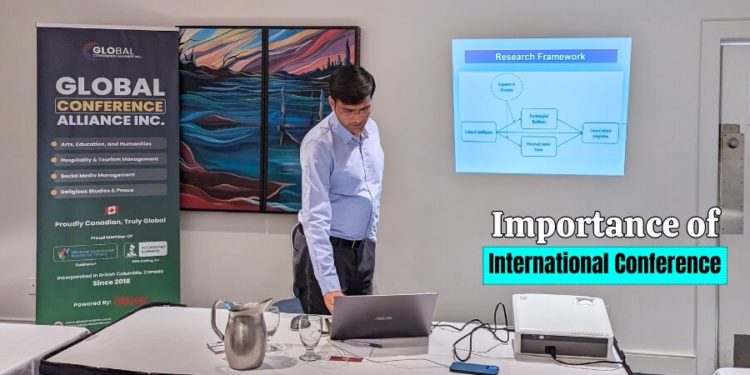International conferences serve as a dynamic platform where professionals from around the globe converge to share knowledge and innovations. But why is an international conference important?
International conferences promote cultural exchange, contribute to professional development, and strengthen personal growth and confidence. By facilitating collaboration and innovation, these events play a crucial role in the global exchange of knowledge.
Dive into the rest of this article to explore the multitude of benefits of attending international conferences and how they can propel your career and personal growth to new heights.
What Happens at an International Conference?
Attending an international conference is an engaging experience that blends learning, networking, and cultural exchange. If you attend events such as conferences in Canada can be a transformative experience, offering both professional and personal growth. Here’s a glimpse of what typically happens at an international conference:
- Presentations and talks reveal the latest research and industry trends. Experts and practitioners share insights through engaging sessions.
- Workshops and tutorials offer hands-on learning experiences. Participants can develop new skills and explore advanced tools.
- Networking opportunities abound, from coffee breaks to social events. These interactions often lead to valuable professional connections.
- Exhibitions and demos showcase the latest technologies and innovations. Attendees can engage directly with exhibitors and discover new products.
- Panel discussions and debates feature lively exchanges of ideas. Experts discuss critical issues, trends, and challenges in their fields.
- Keynote addresses by renowned speakers inspire and motivate. These speeches set the tone for the conference and provided valuable insights.
- Cultural and social events celebrate diversity and promote mutual understanding. Attendees enjoy activities like cultural evenings, gala dinners, and city tours.
- Poster sessions allow researchers to display their work visually. Attendees can engage in discussions and ask questions about the research.
- Collaboration and project meetings provide space for planning joint initiatives. Participants can discuss ongoing research and future projects.
- Publication opportunities are available at some conferences. Presenters can disseminate their work through published proceedings, papers, or abstracts.
Can Anyone Attend an International conference?
Yes, anyone can attend an international conference. These events are open to professionals, researchers, students, and enthusiasts from various fields. Participation usually requires registration and sometimes payment of a fee, but the benefits are invaluable.
Conferences offer diverse sessions catering to different interests. Attendees can choose from presentations, workshops, and networking events that match their expertise and goals. These gatherings provide a platform for learning, sharing, and connecting with industry leaders. The inclusive environment encourages participation from a global audience.
Regardless of your career stage, an international conference can be a rewarding experience. Students and early-career professionals gain exposure and networking opportunities. Established experts can share their knowledge and engage with peers. These events foster a sense of community and collaboration across disciplines.
Why is an International Conference Important?
International conferences are vital events that offer numerous benefits to participants from various fields. These events provide a unique platform for learning, networking, and professional development. Here are some reasons why attending an international conference is important:
Global Networking Opportunities
International conferences connect professionals from around the world. Attendees can build relationships with peers, mentors, and potential collaborators. These connections often lead to future collaborations and partnerships.
Meeting new people from different countries broadens your professional network. You gain exposure to diverse perspectives and experiences. This global network can be invaluable for career growth and opportunities.
Knowledge Exchange
Presentations and talks at conferences share the latest research and innovations. Attendees can learn about new developments in their field. This exchange of knowledge drives progress and innovation.
Interactive sessions, like workshops and tutorials, deepen understanding. Participants can engage in hands-on activities and learn new skills. This comprehensive learning experience improves professional expertise.
Staying Updated on Trends
Conferences highlight current industry trends and future directions. Attendees gain insights into emerging technologies and practices. Staying updated is crucial for remaining competitive in any field.
Keynote speeches by industry leaders provide valuable foresight. These talks often set the tone for future developments. Understanding trends helps professionals anticipate and adapt to changes.
Professional Development
Attending conferences contributes to continuous professional growth. Participants can attend sessions that will improve their skills and knowledge. This ongoing learning is essential for career advancement.
Many conferences offer certification for attendance. These credentials can boost your professional profile. Investing in professional development is a key to long-term success.
Cultural Exchange
Conferences promote cultural exchange and understanding. Participants from different backgrounds share their unique perspectives. This diversity enriches the overall experience and fosters global unity.
Social events and cultural activities are integral to conferences. These events provide a relaxed environment to learn about other cultures. They provide opportunities for personal growth and cultural awareness.
Inspiration and Motivation
Keynote addresses and panel discussions can be highly inspiring. Hearing from successful leaders motivates attendees. This inspiration can ignite new ideas and drive personal goals.
Witnessing groundbreaking innovations and success stories boosts morale. It encourages participants to pursue their ambitions with renewed vigor. Conferences often leave attendees feeling energized and motivated.
Publication and Recognition
Presenting at a conference provides recognition for your work. Many conferences publish proceedings, papers, or abstracts. This dissemination of knowledge reaches a wider audience.
Being published builds your professional credibility. It provides a platform to share your research with the global community. Recognition from peers can open doors to new opportunities
How Should You Utilize an International Conference?
Attending an international conference can be invaluable for your career and personal growth. To make the most of this opportunity, it’s crucial to approach it strategically. Here’s a step-by-step guide on how to utilize an international conference effectively:
Step 1: Pre-Conference Preparation
- Research the conference agenda and speakers beforehand. Identify sessions and workshops that align with your interests. Planning helps you make the most of your time.
- Set clear objectives for what you want to achieve. This could include networking, learning specific skills, or finding collaborators. Clear goals keep you focused and motivated.
- Prepare your materials, such as business cards and a concise introduction. Having these ready makes networking smoother. First impressions matter, so be prepared to present yourself well.
Step 2: Engage in Sessions
- Attend sessions that are relevant to your field. Take notes and ask questions to engage actively. This helps you absorb and retain information better.
- Participate in workshops and tutorials. These interactive sessions provide hands-on experience and in-depth learning. They are often the most rewarding parts of the conference.
- Don’t shy away from poster sessions. Engage with researchers and ask about their work. These discussions can spark new ideas and collaborations.
Step 3: Network Effectively
- Make the most of networking opportunities. Approach people during breaks and social events. Introduce yourself confidently and share your interests.
- Exchange contact information with new connections. Follow up with a friendly email after the conference. Maintaining these connections can lead to future opportunities.
- Join discussions and engage with attendees on social media. Use conference hashtags to stay connected. Social media can extend your networking beyond the event.
Step 4: Explore Exhibitions
- Visit the exhibition area to see the latest innovations. Engage with exhibitors and ask about their products. This can provide insights into industry trends.
- Collect brochures and materials from exhibitors. Review them later to identify useful tools and technologies. These can expand your knowledge and resources.
- Participate in product demos and ask for trials. Hands-on experience with new tools can be highly valuable. It helps you understand their practical applications.
Step 5: Attend Social Events
- Participate in social and cultural events. These informal settings are perfect for building relationships. They offer a relaxed environment to connect with peers.
- Enjoy cultural activities and explore the host city. These experiences enrich your conference visit. They add a personal growth dimension to your professional development.
- Use these events to unwind and recharge. Balancing learning with relaxation is important. It keeps you energized and motivated throughout the conference.
Step 6: Post-Conference Follow-Up
- Review your notes and materials after the conference. Reflect on what you learned and how it applies to your work. This reinforces your learning.
- Reach out to new contacts with a personalized message. Mention something specific from your conversation. Building genuine connections is key to networking.
- Share your conference experience with colleagues. Present what you learned and how it benefits your team. This adds value to your organization and showcases your proactive approach.
Step 7: Implement Learnings
- Integrate new knowledge and skills into your work. Apply what you’ve learned to improve your projects. Practical application solidifies your learning.
- Stay in touch with contacts and follow up on potential collaborations. Keep the momentum going beyond the conference. Long-term relationships can lead to significant opportunities.
- Reflect on your experience and set new goals for future conferences. Continuous improvement is essential. Each conference should build on the last, enhancing your professional career.
Wrap Up
International conferences are invaluable for establishing global connections, sharing innovations, and enhancing professional growth. These events provide an ideal platform for cultural exchange and continuous learning.
It drives collaboration, inspires new ideas, and keeps professionals abreast of industry trends. These are the reasons why is an international conference important. By actively engaging in these conferences, participants can significantly boost their careers and personal development.
The rich experiences and connections gained from attending can have a lasting impact, making them a crucial component of professional success. Utilize these opportunities to grow, learn, and connect globally.


![7 Best POS Software in the UK [2026 Edition]](https://todaynews.co.uk/wp-content/uploads/2026/02/7-Best-POS-Software-in-the-UK-2026-Edition-360x180.png)








































































